Saw The Losers today. It was quite good. The best action sequences were in the first half which is a bit odd. The second half dragged a bit in places. Excellent work from the cast. Not enough Zoe Saldana. Room for a sequel. Lots of people were already leaving when the titles were interrupted with another bit of movie. And then again.
May 29, 2010
May 26, 2010
Apple market capitalization tops Microsoft
By Joe Wilcox, Betanews For weeks, pundits predicted what happened today: Apple’s value exceeded Microsoft’s. While writing post “The Windows era is over” early this afternoon, Apple’s market capitalization was $227.95 billion and Microsoft’s $228.47 billion, or just $520 million separating them. By the time I posted, at 2:56 pm, Apple’s market cap was $225.98 billion and Microsoft’s was $225.32 billion.In the 20 minutes after, the two companies went on a roller coaster ride of sorts, with Microsoft failing to near $221 billion and Apple rising above $228 billion.For Apple, there has been dramatic change since stock markets collapsed in autumn 2008. Apple’s market cap was $88.68 billion on Oct. 2, 2008 and Microsoft’s was $228.35 billion on Sept. 29, 2008. Mmmm, do you see a difference? Microsoft hasn’t much changed, while Apple, boasted by surging share price, has rapidly gone up. About six weeks before the crash, on Aug. 13, 2008, Apple’s market cap was $158.84 billion compared to $254.83 billion for Microsoft.From one perspective, market valuation doesn’t mean much. It’s mitigated by several factors, including the number of shares publicly traded. But its symbolic significance cannot be understated, particularly considering the long rivalry between Apple and Microsoft and Apple’s near-death experience during the mid 1990s.Something else: Apple and Microsoft were founded about the same time and both companies played important roles launching the mainstream PC industry in the 1980s. But since 2000, Microsoft’s stock has been moribund. Apple shares started a slow surge around 2003, which the September 2008 financial collapse reversed. But throughout 2009, Apple shares rose and rose and rose. Apple shares closed at $100.10 on Oct. 28, 2008. As I write, Apple is trading at $248.15.A more meaningful comparison of the companies — at least as rivals — is revenue and profit. During first calendar quarter, [From Apple market capitalization tops Microsoft]
That’s symbolic. Remember when Apple first passed Dell? Now it could buy Dell with spare change 🙂
Can Crusher
Now that two-weekly bin collections have arrived here we have to start recycling. To fit two weeks of cans into the black box provided for recycling needs a can crusher so I fitted one to the kitchen wall using my new electric drill and masonry drill bits.
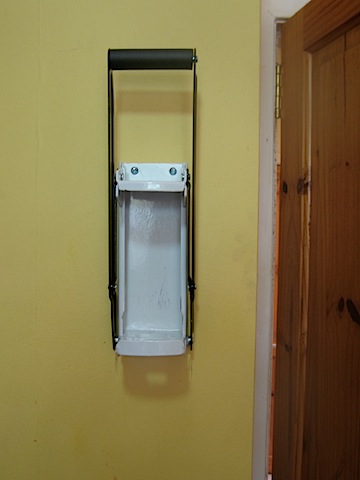
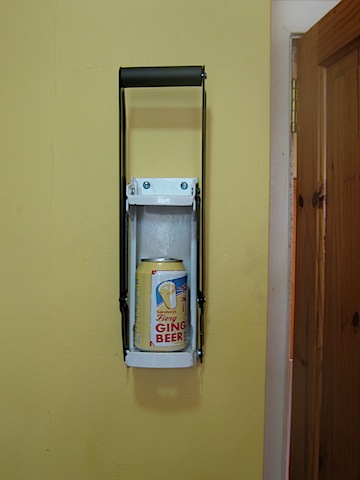
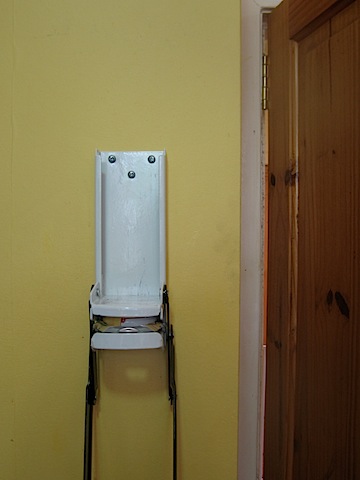
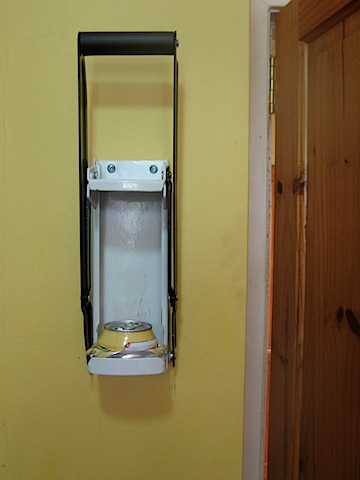
It also crushes more robust cans, like dog-food cans, in a two stage process.
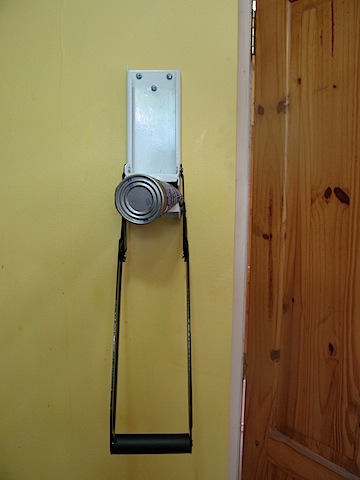
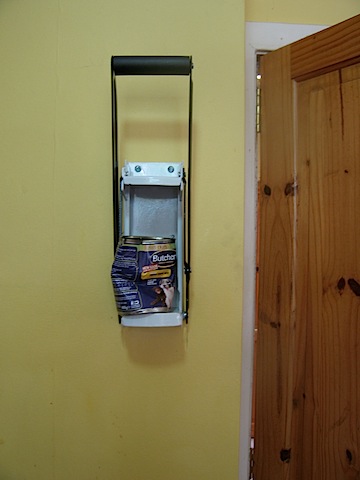
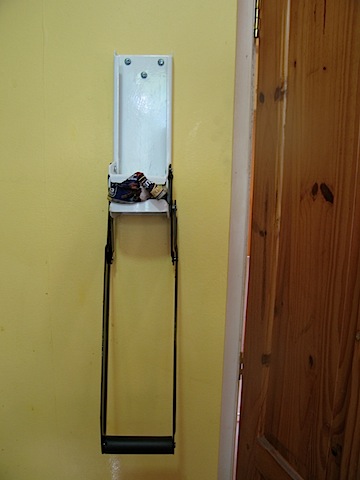
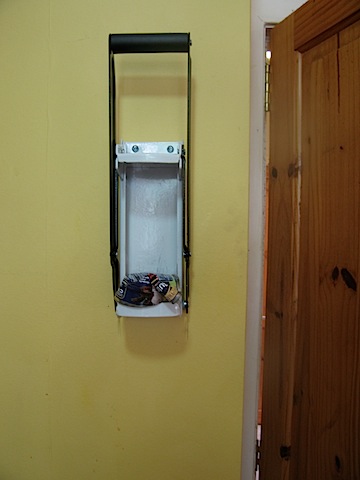
New Drill
Got a new18v battery powered hammer drill. Two battery packs, one-hour charger and so on. Cheap but much better than the 9.6v toy I had – it could do a few minutes of screw-driving into wood and then needed a five-hour recharge of its sole battery pack. I also got a set of masonry drills since I’m putting a can crusher on the kitchen wall.
After I charged up both batteries of the new drill I used it to drill holes in masonry, drive in screws into masonry and then drive some screws into wood for fitting a latch to keep Pip out of the bathroom. First battery still full of energy!
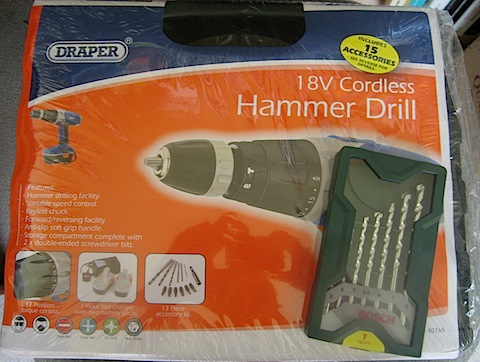
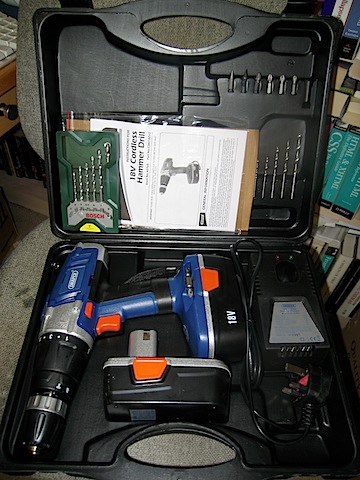
May 25, 2010
Lost Finale Finally
It wasn’t as bad as the ending of Battlestar Galactica. It now seems the somewhat rushed and muddled final season wrap-up of Buffy The Vampire Slayer is about as good as it gets in ending TV shows. But I haven’t finished watching The Shield or Six Feet Under yet so they may surprise me 🙂
May 24, 2010
Lost Finale
So I’ve rebooted the Sky HD box so that it’ll probably work and I should be able to watch it tomorrow after we get back from Pip’s dog training class. Now I just have to remain spoiler-free tomorrow until then 🙂
May 19, 2010
IDC and Gartner award smartphone growth prizes to Apple and Google
Get ready to rumble, the latest Gartner and IDC smartphone numbers are out to give us a pretty good idea of how things shape up globally. Remember, IDC measures vendor shipments while Gartner measures actual handset sales to end users. So what does the data tell us? Well, to start with, in terms of smartphone devices, Gartner claims a 48.7% increase in smartphone sales of 54.3 million units in Q1 2010 compared to Q1 2009 — IDC pegs growth at 56.7% on 54.7 million units for the same period. Both estimates easily outpace the 17% or 21.7% growth in worldwide units of mobile phones moved according to Gartner and IDC, respectively.
IDC’s list of top 5 smartphone device makers (pictured above) has Nokia at the number one spot repeating its 39.3% share as it did in Q1 of 2009 while RIM is down slightly from 20.9% in 2009 to a 19.4% market share in 2010. Apple (up from 10.9% to 16.1%) more than doubled its device shipments in the last year as HTC (up from 4.3% to 4.8%) and Motorola (up from 3.4% to 4.2%) all managed to increase their shares on higher volumes.
Regarding smartphone OS market share, Android’s global numbers echo its success in the US jumping from a 1.6% market share to 9.6% in just one year. Gartner claims that sales of Android-based phones increased 707% year-on-year to displace Windows Mobile in the top 5 for the first time. Apple’s iPhone OS also saw growth from 10.5% in 1Q09 to 15.4% in 1Q10 as both RIM (down from 20.1% to 19.4%) and Symbian (down from 48.8% to 44.3%) dropped. See the OS numbers broken down into a no-nonsense table after the break.Continue reading IDC and Gartner award smartphone growth prizes to Apple and GoogleIDC and Gartner award smartphone growth prizes to Apple and Google originally appeared on Engadget on Wed, 19 May 2010 04:44:00 EST. Please see our terms for use of feeds.Permalink | | Email this | Comments [From IDC and Gartner award smartphone growth prizes to Apple and Google]
It’s pretty clear who’s not doing well anyway. Faster growth is always possible from a small base so let’s see how Android grows now that it is in the same market share range as the other main contenders. Nokia has the most to lose.
May 14, 2010
Curated computing: what’s next for devices in a post-iPad world
In this guest opinion piece, Forrester analyst Sarah Rotman Epps argues that the introduction of the iPad ushers in a whole new era in personal computing, one with less choice, but more relevance. There is something very significant about the iPad beyond how many units it will sell: it’s changing how we think about the PC. The iPad creates a use case for a device that doesn’t do everything your laptop does, targeted at a consumer that uses devices more for consumption than production. The iPad ushers in a new era of personal computing that we call “Curated Computing”—a mode of computing where choice is constrained to deliver less complex, more relevant experiences. Let me repeat that, because it’s the essence of the Curated Computing experience: less choice; more relevance. Consider this: consumers can do a wide variety of things with a Windows PC or Mac, like run commands, install robust software, connect easily to external devices, and save files locally. But the iPad does things differently. Its operating system runs more like a jukebox than a desktop, asking consumers to choose (and often pay for) applications from a predetermined set list. Each of these applications is in itself also curated, since the publisher selects content and functionality that’s appropriate to the form factor, just as a museum curator selects artwork from a larger collection to exhibit in a particular gallery space.
Read the comments on this post
[From Curated computing: what’s next for devices in a post-iPad world]
An interesting viewpoint. I agree with some of it, but of course it isn’t either/or. Many (most?) people will prefer the curated experience but some will want greater control. I reckon they’ll be the minority, like Linux on the desktop.
May 13, 2010
Look at What You Get for $499 in an Android Tablet
A piece of crap. Three pounds, slow, poor battery life, 4 GB of built-in storage, doesn’t work with YouTube, and no support for Android Marketplace apps. All for the same price as a 16 GB iPad.
Or, you could pay just $199 and get the 7-inch Archos 7 Android tablet. It too is slow (“most apps take four to five seconds to open”), it too does not support apps from the Android Marketplace, it doesn’t have an accelerometer, it uses a resistive (rather than capacitive) touchscreen, and it runs the year-old Android 1.5 OS and there’s no way to upgrade it.
★
Oh dear 🙂
Luther
Watched the second episode of the new BBC drama Luther in HD and realised where it is going – Luther is the Clarice Starling to Alice Morgan’s Hannibal Lecter. He’s the troubled cop investigating heinous crimes and she’s the evil genius with a love/hate relationship with him who will no doubt help him figure out some of those crimes in future episodes even as he still tries to collar her for the murders she got away with. Maybe 🙂